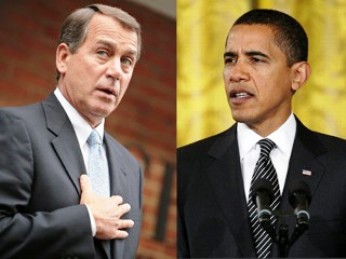Six weeks ago, a friendly conversation ended with a wager. “I’ll bet they settle the NFL strike before the debt-ceiling issue.”
When it comes to wagering, my track record is far from sterling. This time, however, I came out a winner. Why? Simple, money… $9 billion, to be exact. No matter what details the players and owners were haggling over, I believed that neither side would let any of that $9 billion be lost to entrenched thinking and a partial season.

Maybe if their salaries were tied to performance, politicians would wake up and smell their responsibility to the rest of us. With bipartisan talks deadlocked, here are a couple of fact-checks from Politifact.com.
In his Monday night speech, President Obama said, “In the past, raising the debt ceiling was routine. Since the 1950s, Congress has always passed it, and every president has signed it. President Reagan did it 18 times. George W. Bush did it seven times. And we have to do it by next Tuesday, August 2nd, or else we won’t be able to pay all of our bills.”
Politifact rated the president’s statement as True. However,Senator Obama voted against a similar measure under George W. Bush; “a vote Obama now says he regrets.”
Speaker Boehner said, “What we told the president in January was this: The American people will not accept an increase in the debt limit without significant spending cuts and reforms. And over the last six months, we’ve done our best to convince the president to partner with us to do something dramatic to change the fiscal trajectory of our country … something that will boost confidence in our economy, renew a measure of faith in our government, and help small businesses get back on track.
“Last week,” Boehner continued, “the House passed such a plan, and with bipartisan support. It’s called the ‘Cut, Cap, and Balance’ Act. It cuts and caps government spending and paves the way for a balanced budget amendment to the Constitution, which we believe is the best way to stop Washington from spending money it doesn’t have.”
Politifact asked: did the bill really receive bipartisan support?
Well, it depends on what your definition of “bipartisan” is as the following (edited) exchange between MSNBC’s Chris Matthews and Republican and Tea Party supporter Senator Mike Lee demonstrates.
MATTHEWS: “What’s this bipartisan thing you’re talking about? I didn’t see that there. It was overwhelmingly a party-line vote.”
LEE: “Overwhelmingly, but we had five Democrats who voted with us.”
MATTHEWS: “It was a party-line vote. Let’s call it what it is. It was a party-line vote, sir. …Your party controls the House. You passed it. It wasn’t a bipartisan vote.”
LEE: “We have five Democratic votes. Last time I checked, when you have Democrats voting with Republicans, that’s bipartisan.”
MATTHEWS: “You’re talking to the American people on my show, and are trying to tell me this horse and rabbit stew of 234, five of whom are Democrats, is a bipartisan vote? Anybody watching now knows that’s malarkey.”
LEE: “Well, look, we can argue about the meaning of bipartisan…”
MATTHEWS: “I’m not arguing — just speak English here. Do you believe it was a bipartisan vote in the House? …”
LEE: “Chris, what I said was, it had bipartisan support. It had the support of five Democrats. We can argue about the significance of that. But my point is, this is the only piece of legislation anyone has proposed that’s made it anywhere in Congress to raise the debt limit….”
So, do five Democratic votes make it bipartisan?
Politifact found that “The measure passed 234 to 190, largely along party lines, with Republicans in support and Democrats opposed. But five Democrats sided with Republicans to back the bill, and nine Republicans joined the Democrats in opposition to the bill.”
Considering the opposition to the bill by nine Republicans, it doesn’t sound bipartisan, does it?
However, Politifact points out that “Democrats have used exactly the same trick. Back in 2009, Obama said that a Senate committee had approved an early version of health care reform with “both Democratic and Republican support.” Because the measure got one Republican vote out of 23 on the committee, we rated that Barely True.
“Boehner was technically correct,” Politifact says, “that some Democrats voted for the ‘Cut, Cap and Balance’ bill, and, following longstanding Congressional tradition, that enabled him to dub the bill ‘bipartisan.’ But in speaking to a wider audience — a national television address — we think many viewers would be led to believe that the bill in fact had a significant degree of Democratic support, when in fact it did not. This strikes us as just as misleading as Obama’s earlier claim about the health care vote in committee. So we’re giving it the same rating: Barely True.”
And this is just one of the problems with statements coming out of Washington. With American’s confirmation bias working overtime, it’s very easy for both Republican and Democratic leaning citizens to argue the “truth” of statements coming from either side.
That’s why it’s important to carefully check the facts on any issue.
“Facts are stubborn things,” Ronald Reagan once said and with American’s anger and frustration at the boiling point with Washington, the last thing we need is misleading or deceptive wordplay.
The real question before us now is not how the debt-ceiling issue will be settled, but can leadership in Washington actuallylead as they were elected to do?
Comments









